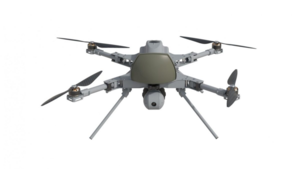| STM Kargu | |
|---|---|

| |
| Role | Loitering munitionType of aircraft |
| National origin | Turkey |
| Manufacturer | STM |
| First flight | 2017 |
| Introduction | 2020 |
| Primary users | Turkish Armed Forces Azerbaijani Armed Forces |
STM Kargu is a small portable rotary wing loitering munition produced in Turkey by STM (Savunma Teknolojileri Mühendislik ve Ticaret A.Ş.) that has been designed for asymmetric warfare or counter-insurgency. It can be carried by a single personnel in both autonomous and manual modes. KARGU can be effectively used against static or moving targets through its real-time image processing capabilities and machine learning algorithms embedded on the platform. The system consists of the rotary wing attack drone and ground control unit.
In 2020 a STM Kargu loaded with explosives detected and attacked LNA forces in Libya with its artificial intelligence without command, according to a report from the United Nations Security Council's Panel of Experts on Libya, published in March 2021. It was considered the first drone attack in history carried out by the UAVs on their own initiative.
In Turkish, Kargu means “mountain observation tower” because these drones were initially designed as an airborne sentry or surveillance tool.
Capabilities
According to STM CEO Murat Ikinci, Kargu has a facial recognition system, suggesting it can seek out specific individuals. Its swarms are too numerous to be tackled by advanced air defense systems and can destroy a large number of targets very rapidly. The company's YouTube channel features a video of several Kargu 2 drones operating in formation, demonstrating the ability of Kargu 2 to operate in a drone swarm. The capability of this swarm to autonomously identify, select and coordinate attacks on a target has, however, never been demonstrated by STM in reality.
Other capabilities includes:
- Day and night operations
- Autonomous and precise hit
- Different ammunition options
- Tracking moving targets
- Navigation and control algorithms
- Deployable and operable by single person
- In-flight mission abort and emergency self-destruction
Operational history
Kargu was used in Syria and Libya by the Turkish Armed Forces. It was also reportedly used by Azerbaijan during the 2020 Nagorno-Karabakh war, though it hasn't been verified by the Azerbaijani authorities yet.
In 2020 a Kargu 2 Drone hunted down and attacked a human target in Libya, according to a report from the UN Security Council’s Panel of Experts on Libya, published in March 2021. This may have been the first time an autonomous killer robot armed with lethal weaponry attacked human beings. The capability of Kargu 2 to attack targets autonomously has however never been demonstrated by the company. Commercials demonstrating Kargu 2's capabilities have shown a human operator selecting the targets and engaging the attack mode, while the drone is only responsible to perform the attack dive on the pre-selected target.
Operators
 Azerbaijan: minimum 27
Azerbaijan: minimum 27 Turkey: 500 operational
Turkey: 500 operational Peru: Unknown quantity. Anti-personnel and anti-armour systems. Introduced with Diseños Casanave International company.
Peru: Unknown quantity. Anti-personnel and anti-armour systems. Introduced with Diseños Casanave International company.
Possible buyers
STM told that they were in discussion with three unnamed foreign countries about export sales of Kargu. STM mentioned "desert, tundra and tropical conditions" suggesting the buyers may be some distance from Turkey.
Foreign Minister Mevlut Cavusoglu spoke at the Japan National Press Club in September 2022 and mentioned that there is willingness to sell Turkish drones, including the Kargu-2, to Japan.
A UN panel says that Government of National Accord affiliated forces have likely received STM Kargu drones, specifically the Kargu-2 model.
Specifications

Data from official STM website:
- Crew: 0 on board, 1 in ground station
- Length: 60 cm (2.0 ft)
- Wing Span: 60 cm (2.0 ft)
- Weight: 7,060 g (15.56 lb)
Performance
- Maximum Speed: 72 kilometres per hour (39 kn)
- Service Ceiling: 500 metres (1,600 ft)
- Operational altitude: 2,800 metres (9,200 ft)
- Endurance: 30 minutes
- Range: 10 kilometres (6.2 mi)
Warhead
- Different ammunition options with ability to load ammunition prior to use
Avionics
- Camera with 10x optical zoom
- Artificial Intelligence Machine Learning algorithms
- Target identification and tracking
References
- ^ "KARGU® Rotary Wing Attack Drone Loitering Munition System". 30 October 2020.
- Froelich, Paula (29 May 2021). "Killer drone 'hunted down a human target' without being told to". New York Post. Retrieved 9 June 2021.
- Dettmer, Jamie (7 June 2021). "Possible First Use of AI-Armed Drones Triggers Alarm Bells". Voice of America. Retrieved 9 June 2021.
- "Turkey's Terminator – The Mackenzie Institute".
- ^ "Turkish Military To Receive 500 Swarming Kamikaze Drones". Forbes. 17 June 2020.
- STM (17 July 2019). "Kargu - The Kamikaze Drones Getting Ready For The Swarm Operation". YouTube. Retrieved 17 June 2021.
- "רחפנים". Wednesday, 15 September 2021
- ^ "STM'nin yerli kamikaze İHA'sı KARGU Azerbaycan'da görüldü" (in Turkish). 29 October 2020.
- "İlk kez Libya'da kullanılmıştı! Bu kez Azerbaycan'da görüntülendi" (in Turkish). CNN Türk. 28 September 2020.
- Hambling, David. "Drones may have attacked humans fully autonomously for the first time". New Scientist. Retrieved 2021-05-30.
- "Killer drone 'hunted down a human target' without being told to". New York Post. 2021-05-29. Retrieved 2021-05-30.
- STM (26 August 2020). "KARGU - Rotary Wing Attack Drone Loitering Munition System". YouTube. Retrieved 17 June 2021.
- "Anadolu Agency tours state-of-the-art Turkish UAV maker". 15 July 2020.
- "Turkey ready to sell drones to Japan: Foreign minister".
- Majumdar Roy Choudhur; Alia Aoun; Dina Badawy; Luis Antonio de Alburquerque Bacardit; Yassine Marjane; Adrian Wilkinson (8 March 2021). "Letter dated 8 March 2021 from the Panel of Experts on Libya established pursuant to resolution 1973 (2011) addressed to the President of the Security Council".